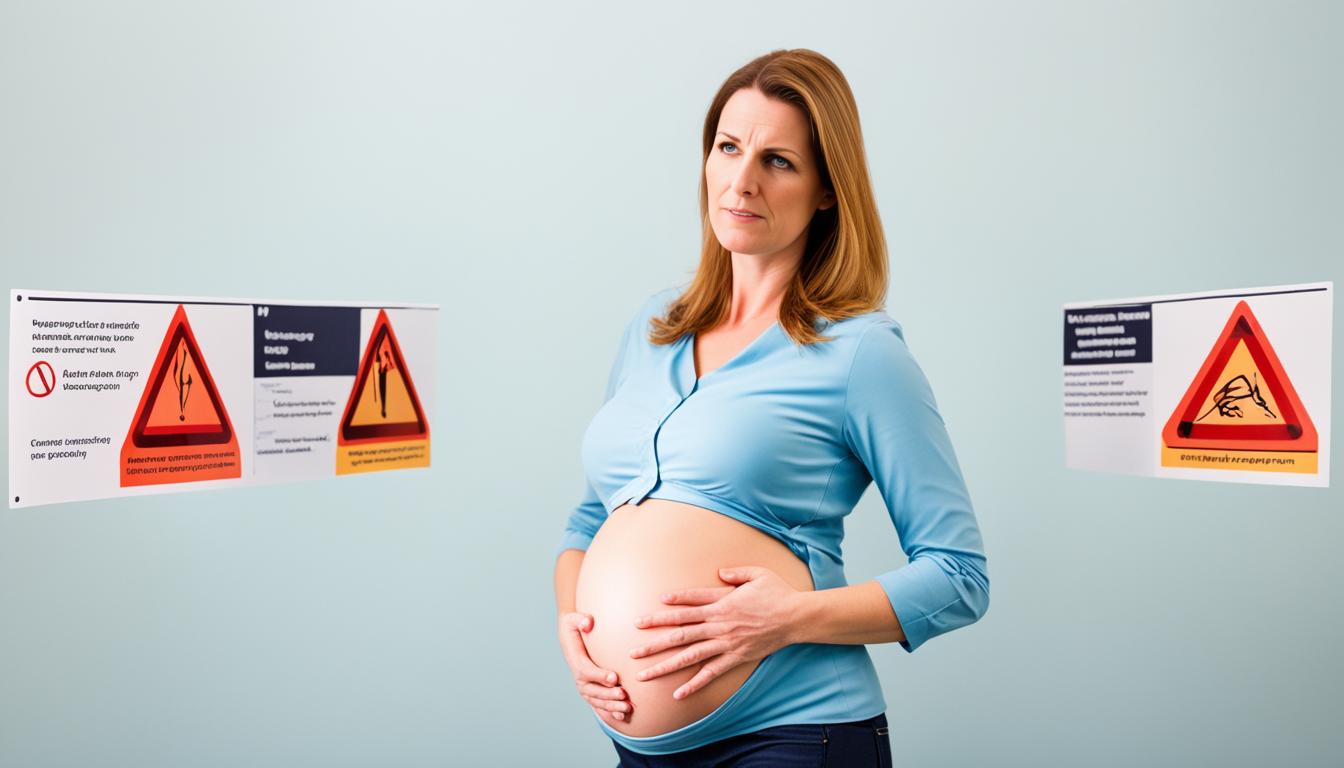Discovering I was expecting filled me with an immense sense of joy and exhilaration. However, this emotion was accompanied by a deluge of inquiries and concerns. A persistent worry of mine was the possibility that experiencing an orgasm in the first trimester might increase the risk of a miscarriage. It’s an uncomfortable consideration for any soon-to-be parent, creating a sense of anxiety and reluctancy towards being intimate with my partner.
I couldn’t shake off the worry, so I decided to do some research and speak to my healthcare provider. I wanted to know the truth and put my mind at ease. And what I found out brought a sense of relief and peace. It turns out that the majority of miscarriages are caused by chromosomal abnormalities in the embryo, not by sexual activity or orgasms during pregnancy.
This newfound knowledge was a game-changer for me. I felt empowered to embrace intimacy and sexual pleasure during this precious time in my life without fear or guilt. And I want you to feel the same sense of liberation.
So, let’s dive deeper into the topic and uncover the truth about orgasms, sex, and miscarriage in the first trimester. Together, we’ll explore the benefits of sexual activity during pregnancy, when it’s best to avoid sex, common concerns, and how to navigate any pain or discomfort that may arise.
Key Takeaways:
- Having an orgasm or engaging in sexual activity during the first trimester of pregnancy does not cause miscarriage in the majority of cases.
- Miscarriages are primarily caused by chromosomal abnormalities in the embryo.
- Consultation with a healthcare provider is essential for individualized guidance and support throughout pregnancy.
- Pregnant individuals with special circumstances should consult with their healthcare provider about the safety and appropriateness of sexual activity.
- Pregnancy hormones can have a significant impact on sexual desire and pleasure. Emotional well-being also plays a vital role in a person’s comfort with sex during pregnancy.
Benefits of Sex During Pregnancy
Sex during pregnancy can be a fulfilling and enjoyable experience for both partners. Not only does it foster intimacy, but it also offers a range of benefits that contribute to a healthy and positive pregnancy journey. Let’s explore the various advantages of sexual activity during pregnancy.
Increased Intimacy
Engaging in sexual activity during pregnancy can strengthen the emotional bond between partners. It provides an opportunity to connect intimately, fostering a sense of love, trust, and understanding. Exploring new ways to pleasure each other can deepen the emotional connection and help maintain a strong relationship during this transformative time.
Strengthened Pelvic Muscles
Sexual intercourse, particularly certain positions, can help tone and strengthen the pelvic muscles. Strong pelvic muscles play a crucial role during childbirth, as they support the uterus, bladder, and bowel. By engaging in regular sex, pregnant individuals can prepare their bodies for labor and improve postnatal recovery.
Better Sleep
Sexual activity releases endorphins, which are natural painkillers and mood enhancers. These endorphins, coupled with the release of oxytocin, commonly known as the “love hormone,” can promote relaxation and result in improved sleep quality. A restful night’s sleep is essential for pregnant individuals’ overall well-being, as it contributes to physical and emotional health.
Possible Boost to the Immune System
Engaging in sexual activity during pregnancy may have a positive impact on the immune system. It is believed that the exchange of bodily fluids during intercourse can introduce antibodies to the pregnant person’s body, potentially boosting their immune response. However, further research is needed to fully understand the extent and mechanisms of this benefit.

| Benefits of Sex During Pregnancy | Description |
|---|---|
| Increased Intimacy | Sexual activity fosters emotional connection and strengthens the bond between partners. |
| Strengthened Pelvic Muscles | Regular sex helps tone and prepare the pelvic muscles for childbirth. |
| Better Sleep | Sexual activity promotes relaxation, releases endorphins, and improves sleep quality. |
| Possible Boost to the Immune System | The exchange of bodily fluids during intercourse may introduce antibodies and potentially enhance the immune response. |
For pregnant individuals without specific complications or medical conditions, sex is generally safe and beneficial throughout all stages of pregnancy. It’s important to communicate openly with your partner and consult with your healthcare provider to ensure a comfortable and enjoyable sexual experience during this special time.
When Should You Avoid Sex During Pregnancy?
In some cases, healthcare providers may advise pregnant individuals to avoid sexual activity and orgasms. This advice may apply to those who have had a threat of miscarriage, a prior premature birth, premature contractions, an incompetent or dilated cervix, unexplained vaginal bleeding or discharge, or fluid leaking. It’s important to consult with a healthcare provider to determine what is safe and appropriate for individual circumstances.
| Risks and Complications | Description |
|---|---|
| Threat of miscarriage | Increased risk of pregnancy loss |
| Prior premature birth | Increased likelihood of preterm labor |
| Premature contractions | Increased risk of early labor |
| Incompetent or dilated cervix | Higher chance of cervical complications |
| Unexplained vaginal bleeding or discharge | Potential signs of underlying issues |
| Fluid leaking | Possible indication of amniotic fluid leakage |
“It’s important to consult with a healthcare provider to determine what is safe and appropriate for individual circumstances.”
Every pregnancy is unique, and the presence of any of these risks or complications does not automatically mean that sexual activity must be completely avoided. It is crucial to discuss your specific situation with a healthcare professional who can provide personalized guidance and support throughout your pregnancy.
Remember, communication with your healthcare provider is essential for a comprehensive understanding of the potential risks and benefits of engaging in sexual activity during pregnancy. Their expertise and guidance will ensure that you make informed decisions that prioritize your health and the well-being of your baby.
Common Concerns About Sex and Miscarriage
Many pregnant individuals have concerns about the potential link between sex, orgasms, and miscarriage. It’s natural to worry about the well-being of your pregnancy, but it’s important to understand the facts and dispel any unnecessary fears.
The truth is that the vast majority of miscarriages are caused by chromosomal abnormalities in the embryo, not by sexual activity or orgasms. In most cases, sex during pregnancy is safe and does not pose a risk to the pregnancy.
However, it’s important to pay attention to any unusual symptoms or complications that may arise after sex. Light bleeding or spotting after sex is generally not a cause for concern, especially if it resolves quickly and is not accompanied by severe pain or heavy bleeding.
If you experience any of the following symptoms after sex, it’s important to consult with your healthcare provider:
- Severe pain or cramping
- Heavy bleeding
- Unexplained or persistent vaginal discharge
- Fluid leaking from the vagina
While these symptoms are not common and usually not related to sexual activity, they could be indicators of underlying complications that require medical attention. It’s always best to seek professional guidance if you have any concerns.

Pain and Discomfort During Sex in the First Trimester
During the first trimester of pregnancy, some individuals may experience pain or discomfort during sexual activity. This can be attributed to various factors such as hormonal changes, vaginal dryness, increased pressure on the bladder, or soreness in the breasts or nipples. It’s important to remember that every pregnancy is different, and what may cause discomfort for one person may not affect another in the same way. The key is to communicate openly with your partner and seek guidance from a healthcare provider if sex becomes consistently painful or uncomfortable.
In the first trimester, hormonal shifts can lead to changes in the reproductive system, including vaginal dryness. This can result in discomfort or pain during intercourse. Using a water-based lubricant can help alleviate this issue and make sexual activity more comfortable.
The growing uterus can also put pressure on the bladder, causing urinary frequency and discomfort during intercourse. Emptying your bladder before engaging in sexual activity and exploring different positions may help minimize this discomfort.
Soreness in the breasts and nipples is a common symptom experienced during early pregnancy. This sensitivity can make sexual activity uncomfortable or painful. It’s important to inform your partner about these changes and find alternative positions or engage in different types of sexual intimacy that do not cause discomfort.
If you experience pain or discomfort during sex in the first trimester, it’s essential to reach out to a healthcare provider for guidance. They can provide personalized advice based on your specific situation and address any concerns or questions you may have.

Expert Tip:
It’s crucial to remember that the priority during pregnancy is the comfort and well-being of the expectant parent. If any form of sexual activity causes pain or discomfort, it’s important to communicate openly with your partner and seek guidance from a healthcare professional. They can offer insight into possible causes and suggest alternative methods of intimacy that do not involve pain or discomfort.
Cramping After Sex in the First Trimester
It’s not uncommon to experience mild cramping after sex in the first trimester. Orgasms and semen can both cause uterine contractions, which may lead to mild cramping for a few hours.
As long as the cramps are mild and resolve shortly after sex, there is usually no cause for concern. Resting and contacting a healthcare provider if the cramps persist can provide further reassurance.

Experiencing cramping after sex can be worrisome, but it’s important to understand that these cramps are generally harmless and a natural response of the uterus. The contractions experienced after sex are similar to those experienced during an orgasm, and they help the uterus in various ways.
During sex, the release of hormones and the physical stimulation lead to an increased blood flow to the uterus and pelvic area. This increased blood flow can trigger contractions, resulting in mild cramping. These contractions are how the body reacts to sexual activity and play a crucial role in the fertilization process.
While cramping after sex can be uncomfortable, it’s usually temporary and subsides within a few hours. Resting and avoiding strenuous activities can help alleviate any discomfort. If the cramps persist or become severe, it’s advisable to reach out to a healthcare provider for further evaluation and guidance.
Pregnant with Special Circumstances: Consult Your Doctor
Pregnant individuals with special circumstances require additional guidance and support to ensure a safe and healthy pregnancy. If you have a history of miscarriage, multiple-birth pregnancy, an incompetent cervix, signs of preterm labor, or placenta previa, it is crucial to consult with your healthcare provider regarding the safety and appropriateness of sexual activity during pregnancy. Each situation is unique, and the guidance of a medical professional will help you make informed decisions for your well-being.
The Importance of Consultation
When facing special circumstances during pregnancy, it becomes essential to consult with a doctor. A medical professional can assess your specific condition, consider any risks or complications, and provide personalized guidance tailored to you. Your doctor will have the knowledge and expertise to evaluate the potential impact of sexual activity on your pregnancy and advise you on the best course of action.
“Consultation with your healthcare provider is crucial for pregnant individuals with special circumstances to ensure the safety and appropriateness of sexual activity during pregnancy.”
Understanding Your Unique Situation
Each special circumstance comes with its own set of considerations and potential risks. By consulting your doctor, you will gain a comprehensive understanding of your unique situation and any precautions you need to take. Your healthcare provider will take into account factors such as your medical history, current condition, and any specific risks associated with your pregnancy to provide the most accurate and relevant advice.
Personalized Advice for Your Well-being
Consulting with your doctor ensures that you receive personalized advice that takes into account your overall well-being. Your healthcare provider will consider not only the specific circumstance but also your physical and emotional health. This holistic approach ensures that you make informed decisions that prioritize your safety, comfort, and the health of your pregnancy.
| Special Circumstances | Considerations |
|---|---|
| History of Miscarriage | Assess any potential risks and provide guidance. |
| Multiple-Birth Pregnancy | Evaluate the impact on both you and the babies. |
| Incompetent Cervix | Determine potential risks and precautions. |
| Signs of Preterm Labor | Address any potential triggers and recommendations. |
| Placenta Previa | Provide guidance on sexual activity and precautions. |
Consulting your doctor ensures that you receive personalized advice, specific to your unique situation. It allows you to navigate your pregnancy with confidence and peace of mind, knowing that you have the necessary support and guidance along the way.

The Role of Hormones and Emotional Well-being During Pregnancy
Pregnancy is a time of immense changes, both physically and emotionally. Hormones play a crucial role in regulating these changes and can have a significant impact on a person’s sexual desire and pleasure. Understanding the role of hormones and nurturing emotional well-being is essential for maintaining a positive and fulfilling sexual experience during pregnancy.
During pregnancy, hormone levels fluctuate, leading to unique changes in a pregnant individual’s body. One of these changes is an increase in libido, or sexual desire, for many expectant parents. The surge of pregnancy hormones can heighten sensitivity, making sexual activity more enjoyable and pleasurable. It’s important to note that every pregnancy is different, and individuals may experience varying degrees of hormonal changes.

Emotional well-being also plays a vital role in a person’s desire and comfort with sex during pregnancy. Pregnancy brings about a whirlwind of emotions, ranging from joy and excitement to anxiety and mood swings. Open communication with a partner about these feelings is key to maintaining emotional connection and support. Seeking emotional support from loved ones or joining support groups can also provide a safe space to express emotions and alleviate any concerns or anxieties.
Remember, your emotional well-being is just as important as your physical well-being during pregnancy. Discuss any concerns or anxieties you may have with your partner, healthcare provider, or a mental health professional. You deserve support and understanding as you navigate this transformative phase of your life.
To nurture emotional well-being during pregnancy, consider exploring relaxation techniques such as deep breathing exercises, meditation, or prenatal yoga. Engaging in activities that bring joy and reduce stress, such as spending quality time with loved ones, enjoying hobbies, or indulging in self-care routines can also contribute to overall emotional well-being.
As hormone levels and emotional well-being can vary throughout pregnancy, it’s important to adapt to individual needs and desires. Some pregnant individuals may find that their sexual desire fluctuates during different trimesters or stages of pregnancy. Open communication, patience, and understanding between partners are essential in navigating these changes together.
The Benefits of Hormone-related Changes in Pregnancy
The hormonal fluctuations experienced during pregnancy can bring about a range of benefits that contribute to both physical and emotional well-being. These benefits may include:
- Increased sexual desire and pleasure
- Heightened sensitivity and responsiveness
- Increased blood flow to the pelvic region
- Enhanced vaginal lubrication
- Release of feel-good hormones such as oxytocin
It’s important to note that every pregnancy is unique, and individuals may experience these benefits to varying degrees. The most crucial aspect is to prioritize open communication, emotional support, and consent between partners to foster a healthy and satisfying sexual experience throughout pregnancy.
Seeking Professional Advice
If you have any concerns or lingering questions about sex or orgasms during pregnancy, it’s always best to seek advice from a qualified OB-GYN or healthcare provider. They have the expertise to provide personalized guidance and address specific concerns related to your individual circumstances. Professional advice can help alleviate worries and ensure a safe and enjoyable sexual experience during pregnancy.
Why Consult an OB-GYN or Healthcare Provider?
Consulting an OB-GYN or healthcare provider during pregnancy is crucial for comprehensive healthcare and support. When it comes to sex and pregnancy, these experts can provide valuable insights, recommendations, and reassurance based on their medical knowledge and experience. They can address any concerns you may have and ensure that your sexual activity aligns with your overall wellness and pregnancy journey.
It’s important to remember that every pregnant individual’s experience is unique, and what works for one person may not work for another. Seeking professional advice allows you to receive personalized care tailored specifically to your needs.
What to Discuss with Your Healthcare Provider?
During your consultation, it’s essential to have an open and honest conversation with your healthcare provider about your concerns related to sex during pregnancy. Some topics you may want to discuss include:
- The safety of sexual activity during your specific stage of pregnancy
- Any complications, risks, or medical conditions that may influence your sexual activity
- Specific concerns about orgasms, discomfort, or pain during sex
- Changes in libido or sexual desire during pregnancy
- Any emotional or psychological factors impacting your sexual experience
Getting the Support You Need
Remember, seeking professional advice doesn’t just address your concerns about sex during pregnancy—it also provides you with the emotional support you may need. Your healthcare provider can offer guidance on maintaining open communication with your partner, managing any emotional changes, and tackling any challenges that may arise. Their expertise and compassionate care can help you navigate this unique time in your life with confidence and peace of mind.

| Benefits of Seeking Professional Advice | Why It’s Important |
|---|---|
| Personalized guidance | Ensures your specific needs and concerns are addressed |
| Reassurance and peace of mind | Reduces anxiety and allows you to enjoy your sexual experience |
| Comprehensive healthcare | Ensures your overall well-being throughout your pregnancy journey |
| Emotional support | Helps you manage emotional changes and challenges |
Conclusion
In conclusion, having an orgasm or engaging in sexual activity during the first trimester of pregnancy does not cause miscarriage in the majority of cases. Miscarriages are primarily caused by chromosomal abnormalities in the embryo. While there may be cases where sexual activity should be avoided due to specific complications or medical conditions, it is generally safe and beneficial for pregnant individuals to engage in sexual activity as long as there are no contraindications. Consultation with a healthcare provider is essential for individualized guidance and support throughout pregnancy.
Can Orgasm During Pregnancy Increase the Risk of Miscarriage in the First Trimester?
There is no evidence to suggest that orgasm during pregnancy increases the risk of miscarriage in the first trimester. However, chronic sleep deprivation and miscarriage may be linked. It’s important for pregnant women to prioritize rest and sleep to minimize any potential risks to their pregnancy.
FAQ
Does orgasm cause miscarriage in the first trimester?
Sex and orgasms during pregnancy are generally safe and do not cause miscarriage. Miscarriages are mostly caused by chromosomal abnormalities in the embryo. Orgasms may cause uterine contractions, but these are typically harmless and do not lead to miscarriage. The baby is protected by the amniotic sac and strong uterine muscles, as well as a mucus plug that seals the cervix.
What are the benefits of sex during pregnancy?
Sex during pregnancy has numerous benefits, including increased intimacy, strengthened pelvic muscles, better sleep, and a possible boost to the immune system. Pregnancy hormones can also enhance pleasure during sexual activity. As long as there are no specific complications or medical conditions, sex is generally safe throughout all stages of pregnancy.
When should you avoid sex during pregnancy?
In some cases, healthcare providers may advise pregnant individuals to avoid sexual activity and orgasms. This advice may apply to those who have had a threat of miscarriage, a prior premature birth, premature contractions, an incompetent or dilated cervix, unexplained vaginal bleeding or discharge, or fluid leaking. It’s important to consult with a healthcare provider to determine what is safe and appropriate for individual circumstances.
Are there concerns about sex and miscarriage during pregnancy?
Many pregnant individuals worry that sex or orgasms could cause a miscarriage. However, the vast majority of miscarriages are caused by chromosomal abnormalities and are not related to sexual activity. Light bleeding or spotting after sex is usually not a cause for concern unless it is accompanied by severe pain, heavy bleeding, or other symptoms of complications. It’s always best to consult with a healthcare provider if there are any concerns.
Is it normal to experience pain and discomfort during sex in the first trimester?
Some pregnant individuals may experience pain or discomfort during sexual activity in the first trimester. This can be due to hormonal changes, vaginal dryness, increased pressure on the bladder, or soreness in the breasts or nipples. It’s important to communicate with your partner and consult with a healthcare provider if sex becomes consistently painful or uncomfortable.
Can cramping occur after sex in the first trimester?
It’s not uncommon to experience mild cramping after sex in the first trimester. Orgasms and semen can both cause uterine contractions, which may lead to mild cramping for a few hours. As long as the cramps are mild and resolve shortly after sex, there is usually no cause for concern. Resting and contacting a healthcare provider if the cramps persist can provide further reassurance.
What should pregnant individuals with special circumstances do?
Pregnant individuals with special circumstances, such as a history of miscarriage, multiple-birth pregnancy, an incompetent cervix, signs of preterm labor, or placenta previa, should consult with their healthcare provider about the safety and appropriateness of sexual activity during pregnancy. Each situation is unique, and it’s important to follow the guidance of a medical professional.
How do hormones and emotional well-being affect sex during pregnancy?
Pregnancy hormones can have a significant impact on sexual desire and pleasure. Many pregnant individuals experience changes in hormone levels that can lead to increased libido and enjoyment of sexual activity. Emotional well-being also plays a crucial role in a person’s desire and comfort with sex during pregnancy. Open communication with a partner and seeking emotional support can contribute to a positive sexual experience during pregnancy.
When should you seek professional advice about sex during pregnancy?
If there are any lingering questions or concerns about sex or orgasms during pregnancy, it’s always best to consult with an OB-GYN or healthcare provider. They can provide personalized advice and address specific concerns based on individual circumstances. Professional guidance and support can help alleviate worries and ensure a safe and enjoyable sexual experience during pregnancy.
In conclusion, what is important to know about orgasms and sex during pregnancy?
In conclusion, having an orgasm or engaging in sexual activity during the first trimester of pregnancy does not cause miscarriage in the majority of cases. Miscarriages are primarily caused by chromosomal abnormalities in the embryo. While there may be cases where sexual activity should be avoided due to specific complications or medical conditions, it is generally safe and beneficial for pregnant individuals to engage in sexual activity as long as there are no contraindications. Consultation with a healthcare provider is essential for individualized guidance and support throughout pregnancy.









